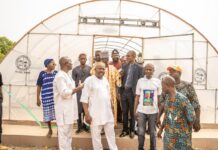The current crisis is historically unprecedented worldwide with several factors converging to make it particularly damaging to people at risk of food insecurity.
This global economic downturn is enveloped with a food crisis that pushed the price of basic staples food beyond the reach of millions of poor people.
In addition, the crisis is affecting large parts of the world simultaneously. This current global economic crises that hit developing countries like Nigeria tended to be confined to individual countries or several countries in a particular region. In such situations, affected countries made recourse it various instrument such as currency devaluation borrowing or increased use of official assistance to face the effects of the crisis.
Faced with the crisis, countries, states and households are faced to find ways to cope with food security.
The food crisis has propelled agricultural and food security, especially renewed commitment to the programme and policies that will involve all stakeholders in food production chain.
What are the major causes underlying food crisis?
Drought, flood and conflicts (farmers/herders crisis)
Kidnapping/banditry
High rate of population growth, and poverty also play a part within an already difficult environment.
How is global security achieved?
Two ways to increase global food production:
Expand the agricultural land area.
Increase yields per unit of area and per year < farm inputs, funding credit/loans.
In achieving food security in spite of the global economic downturn, Kogi state having in mind the importance of food availability to her citizen is in true collaboration with government and non-government agencies across the state to easy the effects.
Kogi State of Nigeria which is covered with a land mass of about 28,313.53sqkm with the mainstay of her economy been agriculture and has comparative advantage in the production of cashew, rice, cassava, palm oil, maize, beniseed, cowpea, yam as well as livestock and aquaculture.
The state collaborate with world bank to fund programme such as the agro processing, productivity enhancement and livelihood support (APPEALS) project which empowers youth/women in rice, cassava and cashew production.
International Fund for Agricultural Development/Value Chain Development Programme (IFAD/VCD) also in rice and cassava.
Also the state collaborate with Central Bank of Nigeria (CBN) to fund project, which will empower youth and women in the development of aquaculture and cassava production and processing.
Under this programme known as Accelerated Agricultural Development Scheme (AADS):
600 earth ponds were constructed, spread across the senatorial district of the state, also fish feed mills constructed to feed the fish.
Also 100 hectares of land each in three (3) senatorial district has been cleared and fractionized to be shared to youth/women beneficiaries with five
(5) cassava processing mills have been established to processes cassava into garri and chips from cassava farms.
The state also established a 50 ton per day rice mill, the confluence rice, which is one of the best rice in the country to take off the millions of ton of paddy rice produced in the state and eight hundred (800) hectares of rice farm established alongside the mills.
The state government through the Ministry of Agriculture has ongoing Agricultural mechanization policy, which has secured approval and procured.
40 MF 375 2 wheel Drive 75 horse power tractor with full implement.
Some agricultural implements like:
100 tractors purchased by H/E and is trusted to two local government areas.
1000 power tillers which were distributed to women farmers all over the state.
Irrigation facilities e.g water pumps etc. procured for use during dry season along the bank of River Niger and Benue.
Procurement of implement/farm inputs across the state facilities which were distributed to farmers.
GREEN HOUSE:
The state also established the Green House at Osara in the central senatorial district for the cultivation of vegetables such as pepper and tomatoes. Another green house is to be established soon in Chikara, Kogi State. The equipment already arrived.
In the area of land clearing, the state has made giant strides to encourage youths/women in agriculture by clearing over 1000 hectares of land at Yagba West in the West, Olamaboro and Dekina in the East to combat food insecurity in the state,
Other measures to ensure food security include:
Anchor Borrower Programme:
The Central Bank of Nigeria (CBN) programme facilitates the empowerment of 14,955 farmers.
The resuscitation of Nursery sites at Kabba, Lokoja and Ochaja, to nurse cocoa, cashew and oil palm seedlings to encourage farmers to cultivate this crops to mitigate food security.
IN THE LIVESTOCK SECTOR
Twenty five (25) veterinary doctors were employed so as to ensure the welfare of the citizenry through healthy meat consumption and improve food security.
The state also constructed/rehabilitated poultry pens for effective poultry production. The state is participating in the National Livestock Transportation Programme (NLTP) of the federal government.
ALAPE STABLE CROPS PROCESSING ZONE:
Kogi state is a beneficiary of one of the 14 SCPZ to be established across the country. The state government signed a Memorandum of Understanding (MoU) with the Nigerian National Petroleum Corporation (NNPC) on the establishment of a Bio-fuel factory and sugarcane plantation at the Alape Staple Crops Processing Zone. The Government released money for the survey of 20,000 jobs for the teeming youths in the state.
Barring factors of Covid-19, flood, farmers/herders clashes, cattle rustling, declining soil fertility among others, the state is poised to record increased food production and food security.
The gains of the past which slowed down by the Covid-19 pandemic are picking up again.
Conclusively, not minding the shortage of resources, Kogi State will not relax in making sure that the availability of food for it citizenry will be her top priority.






